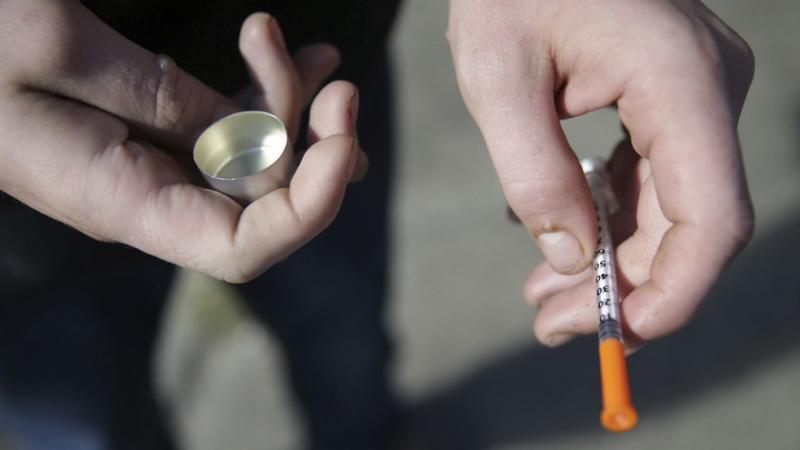With opioid abuse surging, expert panel recommends drug screening for all U.S. adults



It’s time for doctors to start asking every patient, every time: Have you engaged in any illicit drug use?
That’s the new advice from a panel of public health experts who examined whether a primary care physician’s time is well spent — and whether patients’ interests are served — by routine screening for drug abuse.
A draft report issued Tuesday by the U.S. Preventive Services Task Force recommends that all U.S. adults be screened for illicit drug use as long as their doctors can do so accurately and, when abuse is detected, offer their patients effective treatment or refer them to someone who can.
Questions about drug use should not only cover the possibility that a patient is taking illegal street drugs like cocaine or heroin, the task force said. They should also explore whether a patient might be sneaking pills from a family member’s pain medication or getting a boost from stimulants prescribed for a child with attention-deficit/hyperactivity disorder .
An acknowledgment of drug use should prompt a physician to warn a patient about the dangers he or she is courting, offer medication-assisted therapy for addiction if appropriate, and refer the patient to counseling and further treatment.
The task force has long advised doctors to query American adults — and in some cases adolescents — about their drinking and smoking habits. If the new recommendation is adopted, drug abuse would join the list of risky behaviors to be diagnosed and often treated by primary care doctors.
At a time when addiction has become a leading cause of disability in the U.S. and drug poisonings have become the No. 1 cause of injury-related deaths , some say the panel’s advice is long overdue.
A nationwide survey conducted in 2017 by the Substance Abuse and Mental Health Services Administration found that 30.5 million people — roughly 11.5% of American adults — said they had used illicit drugs in the past month.
The task force, a group of experts who advise the federal government on disease prevention, did not extend its recommendation to adolescents ages 12 to 17. Panel members said they could not find enough credible scientific evidence to offer guidance for this age group, and they called for more research on teen drug abuse and treatment.
It’s been more than a decade since the task force last deliberated on the wisdom of population-wide screening for illicit drug use.
In 2008, a year in which 36,450 Americans died of drug overdoses, the panel did not see a compelling case for population-wide screening.
This year, the death toll from drug abuse could wind up being more than twice as high as it was in 2008.
In 2017, the most recent year for which definitive statistics are available, drug overdoses claimed 70,237 lives in the United States, according to the Centers for Disease Control and Prevention. As opioid addiction burgeons and more users are exposed to the powerful synthetic opioid fentanyl , overdose deaths are widely expected to climb even higher in 2018 and 2019.
That context “of course matters,” said behavioral medicine specialist Karina Davidson , who co-chaired the task force’s panel on illicit drug-use screening. But she said the recommendation was prompted by other circumstances as well.
Since 2008, for instance, drug-abuse specialists have devised brief screening mechanisms that help identify illicit drug use and those at risk for it, Davidson said. In addition, she added, a growing stack of research studies has shown that treatments for drug-use disorder and addiction — including behavioral interventions and pharmacological therapies — are effective in helping patients quit or cut back.
Still, effective treatments remain woefully underused, experts say.
The drug regimens that are most useful for combating addiction — a list that includes naltrexone , methadone and buprenorphine — are rarely offered by primary care physicians, who must contend with a gauntlet of paperwork and training to prescribe them. And many addiction specialists, insurers and state legislatures remain suspicious of treatments that use prescription opiates to wean people off illicit opioids.
The new recommendation could help change that, Davidson said.
If doctors know they will be expected to ask about and address their patients’ illicit drug use, more of them will probably do the work necessary to prescribe anti-addiction drugs, and more of them will develop relationships with other care providers to whom they can refer patients for treatment, she said.
If patients come to expect that doctors will ask every adult about drug use, they’ll be less likely to feel stigmatized when the question arises, and more likely to acknowledge they might need help, she added.
“If everyone is asked, we can get to some people who are at a less-severe stage in their drug use, not all the way into addiction,” Davidson said.
The draft recommendation statement is posted on the U.S. Preventive Services Task Force website, along with a review of the research on which the recommendation is based. The public is invited to submit comments until Sept. 9; after those are considered, the advice may be modified and finalized.





The intention is good, but more funding for substance abuse treatment is needed. Once a patient is identified as having an addiction, where do they go for treatment? For many, it's prison, which is not equipped to treat addictions. And for many, it's...nowhere. They just don't receive treatment, at all.
Forcing people into mandatory drug testing sounds awfully unconstitutional and how things are done in places like Russia and China.
But never fear, the left wingers think they have the answer to yet another problem that probably doesn't have a solution.
I agree 100%.
I'd be against that, too. Good thing nobody is suggesting mandatory drug testing, other than those making false statements so they can vilify those with whom they disagree politically.
It’s time for doctors to start asking every patient, every time: Have you engaged in any illicit drug use?
I'm certainly against that.
It's no different from asking if you smoke or drink. It's not mandatory testing, and it's not even mandatory to answer.
These are reasonable health-related questions meant to identify health problems.
Strikes me as a "surveillance for the betterment of Oceania as a whole".
They're just questions on a medical history form. Many doctors have been asking some of them for years now. Same as asking about smoking, drinking, diet, and exercise. They're confidential, and there is no penalty for either refusing to answer, or for lying.
Here are the concerns Sandy,
We really know patients confidentiality is not 100%. We also know drinking and smoking are not illegal, whereas illicit drugs are.It is a sly intrusion into private and personal information which could land someone in to incarseration.
Too much like Big Brother Is Watching.
Some may be willing to give up their right to privacy in certain matters. It is making me cringe and bringing back thoughts of George Wells 1984.
It is one of those things of "where does it end"? So my quote from the story in my first post.
And if the patient will be prescribed something that might interact with a drug they're taking? If the patient needs surgery, where information regarding potential compromised liver function is critical knowledge for the patient's safety?
This isn't to be shared with the government, and it is in fact illegal to do so without a subpoena, which requires probable cause to obtain.
I can understand a specific question if a known harmful or lethal drug interaction is possible with a certain prescription.
But not a set of the standard screening questions.
Same with a medical procedure such as surgery. Although the specific example of liver function impairment will be answered during the standard battery of blood test prior to a patient going under.
I was happy to answer no to some specific questions in this area back in 2017 when I found my self in hospital a couple times. They were specific questions to a specific issue which sent me for medical treatment. Had the answer been yes, I would have answered accordingly, however I don't do illicit drugs.
I also understand a legal procedure is needed to hand that information over to authorities. I also understand any computer system can be hacked. The more of that information that is on file the greater the potential damage when the system is hacked.
JMO, this set of questions should not be part of blanket screening.
If your (generic "your") doesn't know your health conditions, including legal and illegal drugs, they're working in the dark.
I understand the confidentiality issue. But I also understand doctors needing a tool to screen for a common health problem.
I just saw a post on another forum about a dentist who was investigated by his state board because his patient nearly bled out after routine extractions. Turned out the patient had addiction problems that severely compromised his liver functions. Blood work is not routine for all surgeries, and not feasible for emergency surgeries.
It’s time for doctors to start asking every patient, every time: "Have you engaged in any illicit drug use?"
Every time I've been to the doctors office, there "IS" a place on the form that asks if you're on any "Medication" .
So if one refuses what is the consequence....fine, jail, until they give up their urine or blood.
This is stupid.